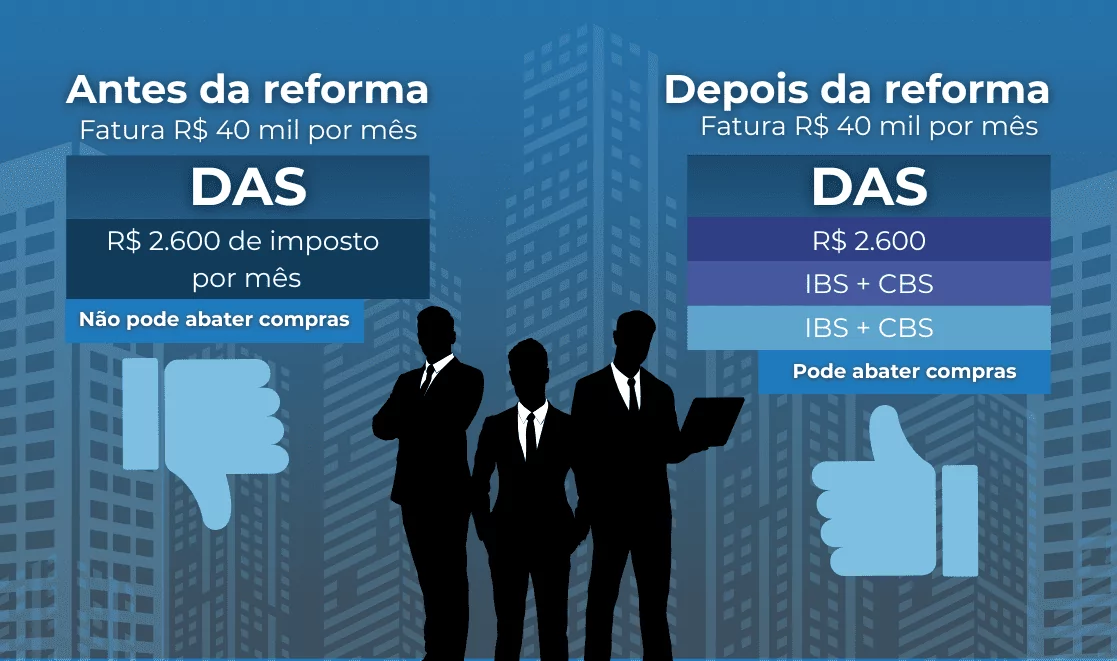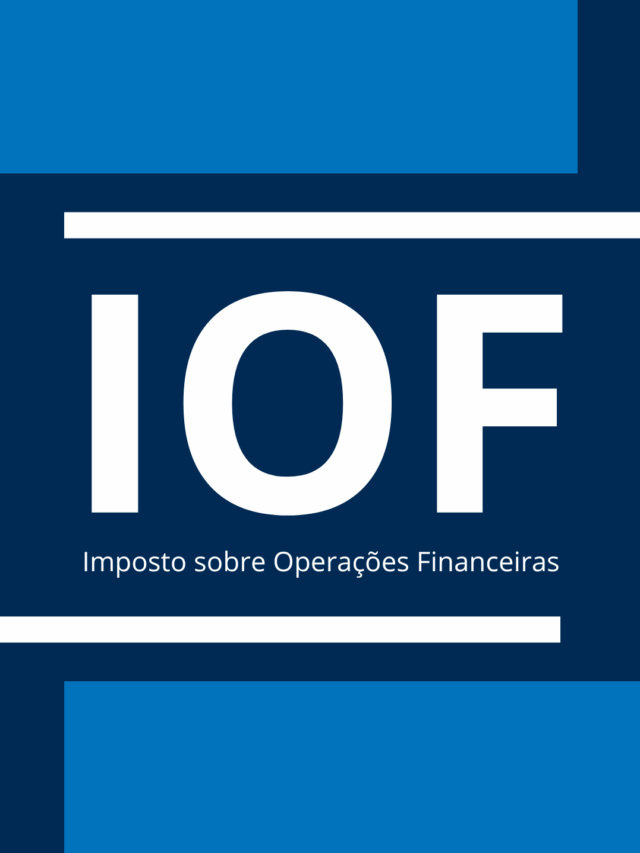If you're a micro or small business owner, you're probably wondering: "What about Simples Nacional in the Tax Reform?"
With the approval of the Complementary Law 214/2025The bill, which regulates part of the Tax Reform in Brazil, has raised many doubts in the business community - especially among those who opt for Simples Nacional.
The good news is that Simples Nacional will continue to existeven with the creation of new taxes IBS (Goods and Services Tax) e CBS (Contribution on Goods and Services)which replace a number of current taxes, such as PIS, COFINS, ICMS and ISS.
However, the regime will undergo important adaptationswhich can have a direct impact on the pockets and management of small businesses.
In this article, written by the CLM Controller AccountingLet's make it simple and straightforward:
- Whether Simples Nacional will end or not;
- What are the tax options for Simples companies in the Reform?
- What changes in practice for Simples members;
- And how you can prepare for this transition without any surprises.
How Simples Nacional will adapt to Tax reform? Find out in our podcast what changes with IBS and CBS and how to prepare your company for this transition.
Will Simples Nacional end?
The first question that arises is: will Simples Nacional end with the Tax Reform?
The answer is no. Simples Nacional will be maintained.
The text of the LC 214/2025The bill, which regulates the Tax Reform, guarantees that the regime will continue to exist, preserving its principles of tax simplification, favorable treatment and unification of taxes for micro and small companies.
However, as two new taxes - IBS (state and municipal) and CBS (federal) - it will be necessary to adjust the way these taxes are paid for those who are in Simples.
So rest assured: the Simples Nacional will not be abolishedbut rather adapted to the country's new tax reality.
Tax options for Simples companies in the Reform
With the approval of the Tax reform for 2025companies opting for Simples Nacional will have two taxation options on new taxes IBS and CBS.
Option 1: Remain in Simples with unified DAS
The company continues to pay taxes for DAS (Simples Nacional Collection Document), which will include:
- IRPJ (Corporate Income Tax)
- CSLL (Social Contribution on Net Profit)
- CPP (Employer's Social Security Contribution)
- ICMS (Tax on Circulation of Goods)
- ISS (Service Tax)
However, the new taxes IBS and CBS will be outside the DASdepending on the activity carried out.
Option 2: Opt for the regular IBS/CBS scheme
If the company wishes, it can exclusion of IBS and CBS from Simples Nacionalyou will now have to pay these two taxes in the regular systemas companies in the Presumed Profit or Real Profit.
Why would that be interesting?
- Because in the regular IBS and CBS regime there will be the principle of full non-cumulativenessi.e. the right to take tax credits in a broad senseincluding services, purchases and inputs.
- For activities that have a lot spent on suppliers and inputsThis can be advantageous.
This means that if you opt out of DAS for IBS/CBS, the company will remains in Simples Nacional for other taxes (IRPJ, CSLL, CPP, ICMS and ISS)but collects IBS and CBS on the outsidein the regular model.

Spreadsheet
Simples taxes
What changes in practice for those who belong to Simples?
Although Simples Nacional continues to existThe truth is that there will be significant practical changes in the day-to-day running of companies.
1. IBS and CBS can be paid "outside" the DAS
If your company operates in sectors that involve the movement of goods (commerce, industry) or services, it could be thank you or choose for collecting IBS and CBS outside the DAS.
In practice, this creates a hybrid modelWhere part of the taxes remain in the DAS and another part is calculated and paid like any other company outside the Simples system.
Practical example:
Imagine a trade microenterprise, which today makes up to R$ 360,000 a year and collects everything through the DAS at an average rate of 6% to 7%.
With the Reform, she will be able to choose (or be forced, depending on the situation) to pay:
- IRPJ, CSLL, CPP and ICMS via DAS;
- IBS and CBS separatelyissuing invoices with these taxes highlighted, calculating credits and debits month by month.
If this company buys products from suppliers with IBS and CBS highlighted, it can take credits for these taxesThis is something that does not exist today in Simples Nacional.
2.Ajustes nos sistemas de emissão de notas e gestão
If the company opts for the hybrid model (DAS + separate IBS/CBS), it will be necessary:
- Updating invoice issuing systemsThey must now calculate and highlight IBS and CBS in their operations;
- Make a more detailed accounting control, similar to companies outside the Simples system, in order to calculating credits and debits for these taxes.
3. accessory declarations and new obligations
Currently, one of the biggest advantages of Simples Nacional is the reduction of ancillary obligations.
With the reform, companies that pay IBS and CBS outside the DAS will have to:
- Submit specific IBS and CBS declarations;
- Closely monitoring the calculation of these taxes, their credits and debits;
- Follow tax obligations similar to Presumed Profit and Real Profit companies, even if they remain in Simples.
4. more complex tax calculation, but with a chance of savings
The calculation of IBS and CBS is non-cumulativeThis allows the deduction of tax credits on:
- Inputs;
- Materials;
- Services rendered;
- Rent;
- Energy, among others.
Therefore, businesses that have a relevant cost chain can pay less tax in the endeven with the obligation of more robust fiscal control.

How small companies can prepare for the changes to Simples Nacional
Faced with this new scenario, a fundamental question arises: how can micro and small businesses prepare to face the changes to Simples Nacional in the Tax Reform?
The answer lies in tax planning. More than ever, it will be essential to analyze your company's profile, its cost chain, its suppliers and its business model.
Assess whether it's worth continuing with DAS or migrating to IBS/CBS
The decision to remain with the DAS including all taxes or opt for the hybrid model (DAS + separate IBS/CBS) is not trivial.
Companies with high volume of purchases, services and operating expenses can benefit from non-cumulative nature of IBS and CBSThis generates credits and, consequently, a lower tax burden.
On the other hand, companies that have few inputs and suppliersas self-employed service providers, perhaps continue better in the traditional DASwithout having to deal with the new accessory obligations.
Review pricing
With the possible incidence of IBS and CBS outside the DASit will be necessary to review the price formationThis is especially true if your audience is end consumers, who don't generate credit for you.
B2B companies (which sell to other companies) can pass on the tax with less impact, as their customers will take credit. Those who serve the end consumer, on the other hand, will need to calculate well so as not to lose competitiveness.
Adjusting systems and processes
Get ready for:
- Adjusting the system for issuing invoices, which will now highlight IBS and CBS;
- Implementing internal controls for calculating credits and debits for these taxes;
- Ensure that your company's accounting system is ready to comply with the new ancillary obligations.
Have specialized accounting support
More than ever, partnering with a consultative and up-to-date accountant will make all the difference. A CLM Controller Accounting is closely monitoring all the changes and is ready to help your company make the best decision.
Practical comparative example: Simples Nacional today vs. post-Reform
Let's illustrate how the changes look with a realistic example:
Current scenario
One trade microenterprise invoice R$ 40,000 per month (R$ 480,000/year). Today, under Simples Nacional, it pays an average rate of 6.5% on turnover, collecting via DAS a value of R$ 2,600 per month. This amount includes IRPJ, CSLL, CPP, ICMS and ISS.
There is no right to a tax credit.
Post-Reform scenario (hybrid model)
As of the Reform, it will be able to choose to collect:
- IRPJ, CSLL, CPP and ICMS by DAS (keeping part of the simplicity);
- IBS and CBS outside the DASwith an estimated joint rate of 26.5%but applied to the base with the possibility of credits.
Simulation:
- Buys goods worth R$ 20,000with IBS and CBS highlighted (generating credits of 26.5% on this amount = R$ 5,300 credit);
- He sells the products for R$ 40,000, with IBS and CBS of 26.5% = R$ 10,600 flow rate;
- Tax due on sale: R$ 10,600 - 5,300 (credit) = R$ 5.300 of IBS/CBS;
- Sum to DAS (R$ 2.600) = R$ 7,900 in total taxes.
Now compare:
- Before: R$ 2,600 fixed by DAS.
- After (if you opt for the hybrid): R$ 7,900, but with the right to credits and rebates.
If you're a company with a lot of purchases, it can pay off. If it's a service provider or an activity with few inputs, the cost may be higher in the hybrid model.
Which businesses can benefit most from the hybrid Simples Nacional?
One of the great uncertainties among entrepreneurs is understanding for whom it is worth joining the hybrid model of Simples Nacional in the Tax Reformwhere IBS and CBS taxes are collected separately.
Businesses that can benefit:
- Industries and businesses: These sectors often have a production chain with many inputs, suppliers and operating costs. In the hybrid regime, each purchase generates a credit to IBS and CBSThis can be deducted from the tax due on sales.
- B2B companies: Businesses that sell to other companies can also benefit, as their customers take credit for the taxes, allowing them to pass on the IBS and CBS without affecting competitiveness as much.
- E-commerces that work with stock: Those who resell goods and have logistics and warehousing expenses can accumulate relevant credits.
Who should be careful:
- Self-employed professionals and service providers: Psychologists, lawyers, designers, copywriters, consultants and other activities that lack relevant inputs tend to not benefit from the hybrid regime. After all, they will have little or no credit to use, and will pay IBS and CBS in full on turnover.
- Companies that serve the end consumer: Restaurants, beauty salons, local retailers, among others. These clients do not take creditTherefore, passing on taxes can make the final price more expensive and reduce competitiveness.
Practical scenario with mixed service and commerce
Now imagine a small company that works with combined trade and servicesas a equipment maintenance and sales company.
Today, under Simples Nacional, it collects all the taxes together in the DAS. Post-Reform, it will need to evaluate:
- The sales part generates IBS/CBS credits on purchases of resold products;
- The services section generally doesn't generate credits, but it does have IBS and CBS on the full value of the service.
This company will therefore have to carry out a very detailed analysis to check whether, in total, the credits obtained on the trade side compensate for what will be overpaid on the services side.
Frequently asked questions about Simples Nacional in the tax reform
will Simples Nacional end with the Tax Reform?
No. Simples Nacional will be maintained by the Tax Reform, but it will undergo adaptations to integrate with the new tax model, such as the inclusion of IBS in the regime.
2. What changes are planned for tax calculation in Simples Nacional?
The main change is the creation of the IBS (Goods and Services Tax), which will replace some of the current taxes. The way it is calculated and collected may have specific rules, requiring companies to update and plan.
3. What is IBS and how does it impact Simples companies?
The IBS is a single tax that unifies state and municipal taxes. For Simples companies, it will be calculated separately, outside the DAS, requiring new control for calculation and payment.
4. Do micro-enterprises and MEIs need to do anything now to prepare?
Yes. Although it is still in the regulatory phase, it is important to monitor the changes, review processes and plan cash flow to avoid surprises when the new rules come into force.
5. How can we avoid tax surprises with these changes?
The best way is to do good tax planning. Understanding the changes, reviewing frameworks and having specialized accounting support helps to keep the tax burden under control and avoid extra costs.

Pay extra attention to pricing
If your company chooses or is forced to migrate to the hybrid model, it will be necessary to rethink the entire price formationtaking into account:
- What can and cannot be used as credit;
- What percentage of your customers are final consumers (who don't take credit) or companies (who take advantage of IBS/CBS credit);
- How this affects margins and competitiveness.
A very common mistake is forget to include IBS and CBS in the pricesThis can lead to a loss of margin and even a loss.
On the other hand, companies that do this correctly can benefit even more than they do today, especially if they operate in a production chain with many inputs.
The importance of ongoing tax planning
With the new scenario, tax planning will no longer be a one-off activity - it will become something constant.
It will be necessary:
- Evaluate month by month whether the hybrid scheme is still advantageous;
- Monitoring the use of IBS/CBS credits;
- Follow up on possible updates from the IBS Steering Committee and the IRS on the CBS;
- Simulate scenarios of growth or reduction in turnover, changes in suppliers, expansion of activities, among others.
Businesses that adopt an active stance, closely monitoring their finances with the support of a advisory accountingThey will be better prepared to pay less tax within the law and remain competitive.
Do you want to understand, in a simple and direct way, how the Tax Reform will impact Simples Nacional?
In this video, CLM Controller explains the main points of the new tax structure and how it could affect micro and small businesses. A clear analysis, with practical examples, so that you can make decisions more confidently.
Conclusion
The truth is that Tax reform and Simples Nacional will go hand in hand in the coming yearsbut with significant changes that require attention and planning.
O Simples Nacional will not endbut its relationship with the new taxes IBS and CBS will bring a more complex model, especially for those who choose to collect these taxes outside the DAS.
Whatever your decision - to stay with Simples Integral, join the hybrid model, or even consider migrating to Lucro Presumido or Lucro Real - one thing is certain: you will need a consultative, strategic and up-to-date accountant to guide you.
Does your Simples company need to adapt to the new rules?
Count on CLM Controller Contabilidade's tax consultancy to navigate these changes without surprises, with planning, security and savings.

Upgrade your finances:
Talk to us!

Complete Guide to
Tax reform









